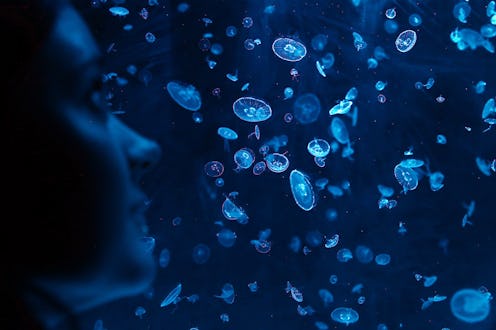News
Billions Of Weird Blue Animals Cover West Coast

About a billion beautiful blue animals called "by-the-wind sailors" have washed up (sailed up?) onto the West Coast over the past few weeks. The jellyfish-like animals, scientifically known as Velella velella, started washing up on the coasts of Oregon and Washington about six weeks ago and have since made their way down to California, marine biologist Kevin Raskoff told National Geographic. They look a bit like mini windsurfing boards, except they're alive. According to IFLScience!, the phenomenon is the result of the wind's direction and not a sign that we're continuing to destroy the environment — phew!
IFLScience! describes these creatures as a smaller, less-deadly relative of the Portuguese man-of-war, a horrifying animal made up of a bunch of organisms working together that will sting the crap out of you and leave you wishing you didn't mistake it for a jellyfish. These predators are not as dangerous as their relatives, but they can also sting, and they are also siphonophores, which means they're made up of zooids, or colonies of invertebrate animals that work together to create one animal. (Mind blown!) Even though their stings are less deadly, the no-touch rule still applies. Raskoff told Nat Geo that you might not feel their sting in your fingers, but that if you touch your eyes or more sensitive parts of your skin, things could get painful.
In the wild, by-the-wind sailors are relatively passive. They usually float along on the surface of the open ocean searching for food while riding the currents of the wind and sea with their hardened, triangular sails, according to Nat Geo. In a saddening twist, whenever the wind changes direction, they can be pushed toward shore, where they die and present a beautiful pile up on beaches every three to six years, Raskoff told Nat Geo.
Despite that infrequency, Raskoff told Nat Geo visitors to the beaches shouldn't collect the valella when they dry up, because it's against California law to collect marine life without the proper permits. They also might get quite smelly, according to locals like Frank Lehn, who wrote on the Seaside Aquarium's Facebook page that the animals will start to stink when they rot, according to KGW News.
If you can deal with the smell, though, you can experience and maybe Instagram the beautiful blueness, which so perfectly sums up nature's bizarre and impassive life cycles.
Image: Carl Court/Getty Images